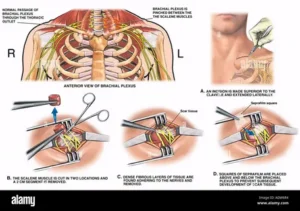Thoracic surgery is a specialized medical field dealing with diseases involving the chest, including the lungs, esophagus, and the region surrounding those organs. With the upsurge of advanced healthcare facilities, thoracic surgery in Dubai has become an excellent option for patients looking for expert care. This blog looks into the procedures involved in thoracic surgery, potential risks, and what to expect when recovering.

What is Thoracic Surgery?
Thoracic surgery refers to any surgical intervention for diseases found in the organs inside the chest cavity, excluding the heart. These interventions are done to treat a myriad of conditions, such as:
- Lung Cancer
- Esophageal Cancer
- Collapsed Lung (Pneumothorax)
- Chest Infections or Abscesses
- Gastroesophageal Reflux Disease (GERD)
- Diaphragm Conditions
Thanks to advances in technology, surgeons such as Dr. Ali Al Dameh are able to conduct both open and minimally invasive thoracic surgery based on patient condition.
Types of Thoracic Surgery Procedures
-
Video-Assisted Thoracoscopic Surgery (VATS):
- A minimally invasive method that uses a small camera known as a thoracoscope, along with specialized instruments.
- Best suited for performing lung biopsies, resecting small tumors, and treating pleural diseases.
-
Lobectomy or Pneumonectomy:
- Removal of a lung lobe (lobectomy) or the whole lung (pneumonectomy) to treat lung cancer.
-
Esophagectomy:
- Removing a portion or the entirety of the esophagus because of cancer or severe damage.
-
Mediastinal Surgery:
- Deals with tumors or cysts that arise in the mediastinum (the region between the lungs).
-
Thoracotomy (Open Surgery):
- An older technique with a bigger incision, used for complicated surgeries such as advanced lung or esophageal cancer.
Risks of Thoracic Surgery
Like all surgeries, thoracic surgery carries some risks. The risk profile depends on the nature of the surgery, the general health of the patient, and the type of procedure. Risks include:
- Infection: There is a small chance of developing an infection at the incision site or in the chest cavity, despite using sterile techniques.
- Bleeding: Bleeding can be excessive and sometimes necessitate further intervention.
- Collapsed Lung (Pneumothorax): Air can build up between the lung and chest wall, causing the lung to temporarily collapse.
- Blood Clots: Immobility during surgery may increase the risk of clots in the legs (deep vein thrombosis) or lungs (pulmonary embolism).
- Respiratory Problems: There can be short-term or, in some cases, even long-term respiratory problems.
Experienced surgeons like Dr. Ali Al Dameh ensure that these risks are minimized by proper surgical procedures and complete pre- and post-operative care.
Recovery Period Following Thoracic Surgery
Recovery period varies with the procedure and the patient’s health condition. Here is a general idea of what to expect:
-
Hospital Stay:
- VATS (Minimally Invasive Surgery): 2-4 days
- Thoracotomy (Open Surgery): 5-10 days
-
Recovery Period:
- Pain management and breathing exercises are essential in the initial weeks.
- You may have fatigue, soreness, and temporary inability to do deep breathing.
-
Return to Normal Activities
- Most patients can return to work and light activities within 4-6 weeks.
- They can recover fully for strenuous activities within 2-3 months.
-
Follow-Up Care
- Follow-up appointments are essential in ensuring proper healing and avoiding complications.
- Rehabilitation exercises, such as physiotherapy, may be advised to enhance lung functioning and mobility.
Conclusion
Thoracic surgery is an important intervention for many serious conditions affecting the chest. Understanding the procedures, risks, and recovery process can help you make an informed decision. If you are considering thoracic surgery in Dubai, consulting with an experienced surgeon like Dr. Ali Al Dameh ensures you receive the best care and support on your journey to recovery.

Leave a Reply